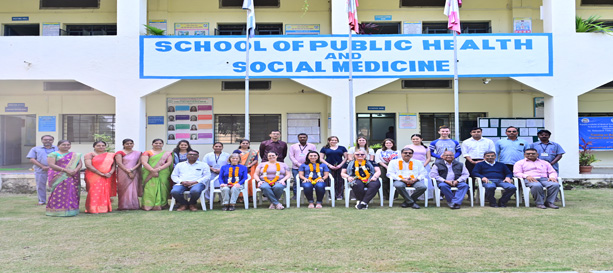
School of Public Health and Social Medicine (SPHSM)
The School of Public Health and Social Medicine (SPHSM) (Formerly Centre for Social Medicine) was a culmination of efforts to address the multi-disciplinary & multi-dimensional needs of the underprivileged and vulnerable sections of rural, tribal, and urban slum population, in a holistic way through education, research, vocational training in Public Health, Social Medicine, Allied Health Sciences and community healthcare and developmental services. Initially Centre for Social Medicine (CSM) was established under Pravara Medical Trust in 2001 to facilitate & enrich the faculty-student-community interactions and collaborates with all academic & research programs in the PIMS-DU campus which include Medicine, Dentistry, Nursing, Physiotherapy, Medical Biotechnology, and other Allied Health Sciences to implement its Unique Pedagogy- Community Oriented Medical and Health Sciences Education”.The SPHSM (formerly CSM) was recognized by Ministry of HRD, UGC, Govt. of India as a Constituent Unit of PIMS-Deemed to be University for offering academic courses in Public Health & Social Medicine under “Faculty of Allied Health Sciences” since 2005.
The Mission
Support and encourage interdisciplinary research, training & education, and service delivery in the fields of public health, social medicine, allied health sciences and community development for the benefit of students, faculty and community at large and act as the conscience of the society specially the marginalized and vulnerable sections.
The Vision:
To be a leading “Centre of Excellence” in Public Health, Social Medicine, Allied Health Sciences, Health equality and Community Development
The Objectives:
- Delineate the structural constraints, which limit the scope of public health and social medicine interventions in the community.
- Train and nurture the students in the fields of public health, social medicine and allied health sciences.
- Conduct and promote research & scholarship in public health, social medicine and allied health sciences.
- Provide comprehensive community oriented primary healthcare and to the needy through innovative means to address health inequality
- Bring behavioral changes and empower people for their health and development.
- To develop networking and partnership with individuals and organizations
The Organizational Structure of the School:
The Mission, Vision and Objectives of the School of Public Health and Social Medicine are being achieved through the following major Programs and Centres:
1. Academic & Research Division – Public Health, Social Work & Allied Health Sciences2. Centre for Community Health & Development
3. Centre for Research in Tribal Health and Services
4. Centre for Vocational and Skill Development Training
The Field Practice Area of SPHSM for Academic, Research, Services & Development Programs:
The school is directly engaged in serving about half-a-million people living in 350+ remote rural & tribal villages and 10 urban slums of Ahmednagar & Nashik districts of Maharashtra through its three Centres of Community Health and Development, Research in Tribal Health and Services, Vocational / Skill Development Training. As per the educational philosophy of PIMS-DU, the academics & training and research of students & faculty is inter-twinned with community engagement, empowerment and development.
Field training is imparted to all students, its own community infrastructure and activities like 10 Rural & Tribal Health Centres, 2 Mobile Medical Clinics, 6 Motorbike Ambulance-cum-Health Clinics, 10 e-health Centres, 24 Gram Arogya Banks (Village Health and Wellness Centres), Village First Aid Centres with trained CHWs & regular community health check-up camps. The Outreach programs and action research projects implemented in various districts of Maharashtra by these Centres encompasses RMNCH+A, CDs (Malaria, TB etc), NCDs (Diabetes, Cancer, HIV/AIDS etc), School Health, Tribal Health and Woman's empowerment in collaboration with government organizations, non-governmental and academic organizations of national and international repute.
Target Population of SPHSM for Community Health & Development Services:
The School focuses their activities on vulnerable sections of the society like women (widowed, disserted, female sex workers), children (orphans, differently abled, school drop-outs, child labour, malnourished etc), rural & tribal, farmers (migratory labour), unorganized labour etc.
Core CompetenciesThe following core competencies that are required to achieve the objectives of the Center are drawn from within the constituent institutes of the University and sister institutes in the area.
- Community Medicine, Public Health Dentistry, Community Physiotherapy & Nursing
- Epidemiology & biostatistics
- population Sciences & Demography
- Natural and Environmental Sciences
- Social Sciences – Sociology, Anthropology, Psychology, Behavioural Sciences
- Healthcare Management, Health Financing and Economics.
